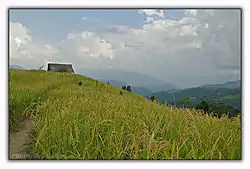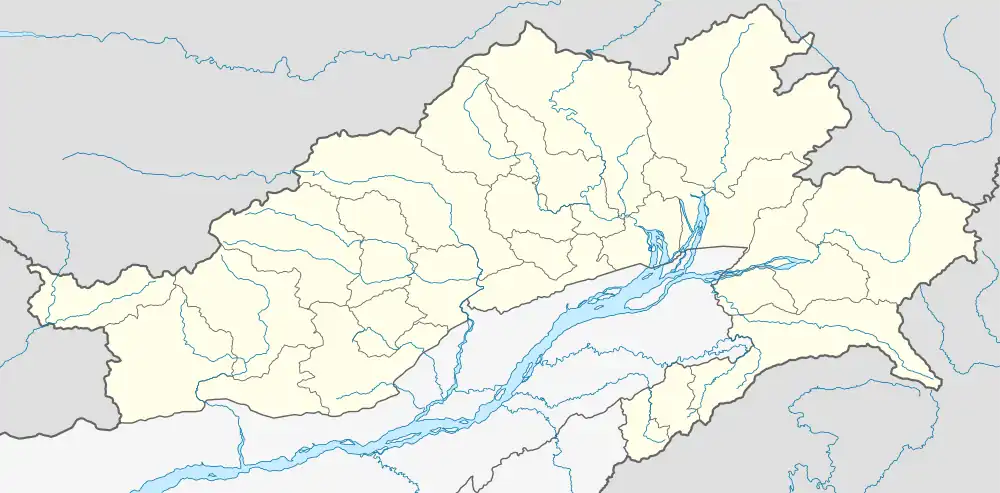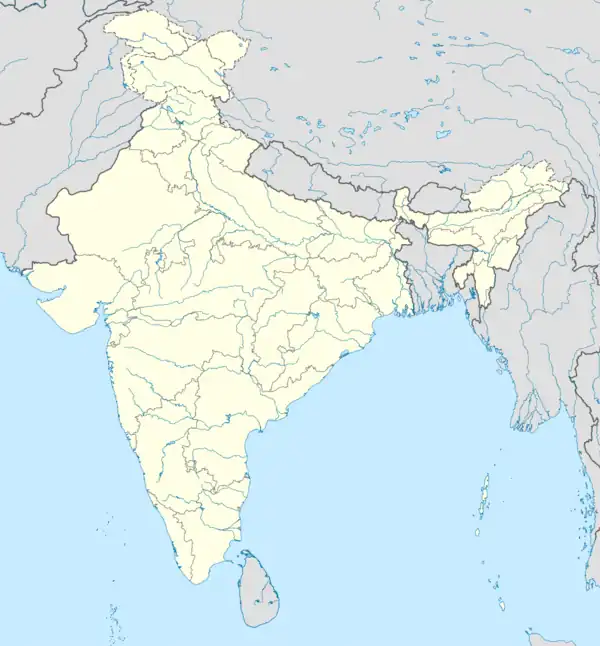Jairampur
Jairampur is a census town in Changlang district in the Indian state of Arunachal Pradesh.
Jairampur | |
|---|---|
city | |
 | |
 Jairampur Location in Arunachal Pradesh, India  Jairampur Jairampur (India) | |
| Coordinates: 27°21′4″N 96°0′57″E | |
| Country | |
| State | Arunachal Pradesh |
| District | Changlang |
| Elevation | 200 m (700 ft) |
| Population (2001) | |
| • Total | 5,918 |
| Languages | |
| • Official | English |
| Time zone | UTC+5:30 (IST) |
| PIN | 792121 |
| ISO 3166 code | IN-AR |
| Vehicle registration | AR 12 |
| Climate | Cwa |
Demographics
Jairampur is an ADC HQ of Changlang district (situated in the southeastern part of Arunachal Pradesh, North East India). A small hilly town along the Indo-Myanmar border and Namchik basin is covered with evergreen tropical rain forest. Where life moves at leisure pace and the howling of hollock gibbons wake you up in the morning. Mother Nature has been generous to bequeath abundant natural resources to this terra firma. It is a wonderful place to be in. Though, the journey through the serpent roads might be tough for some but it is worth when you reach the destination. In this part of the planet, time standstill, life moves at snail pace, worries refrain to meddle, and mind, disdain to overwork.
At the 2001 India census,[1] Jairampur had a population of 5918. Males constitute 57% of the population and females 43%. Jairampur has an average literacy rate of 71%, lower than the national average of 74.5% (2011 census): male literacy is 77%, and female literacy is 64%. In Jairampur, 15% of the population is under 6 years of age.
People
The Tangsas are dominant tribe of these four Circles under Jairampur(Nampong, Manmao, Rima-Putok and Jairampur) which is one of the major tribe of Arunachal Pradesh. There are different sub tribes within the Tangsa, namely Tikhak, Muklom, Havi, Longchang, Mossang, Jugli, Kimsing, Ronrang, Mungrey, Longphi, Longri, Ponthai, Sangwal, Yongkuk, Sakieng, Thamphang etc. They are of Mongoloid descent. According to the legends, The Tangsas originated in a hill called Masoi Sinarupam, (Myanmar). They migrated to India in the 1740s from the north of Myanmar and migrated to the present habitat only in the early 18th century. Traditionally, they are believer of Bon Faith which is portrayed by spirit and ceremonial animal slaughters. Nonetheless over the years many have converted to Buddhism and Christianity. The Tangsas are laborious and peace-loving community. They are experts in handicrafts particularly in woodcarving. The major populations of the Tangsa are agriculturist by occupation. Lifestyle is uncomplicated. Survival is simple. Their warm smiles compel to forget the freezing temperature of January and the hospitality for the guest are the best in the world
References
- "Census of India 2001: Data from the 2001 Census, including cities, villages and towns (Provisional)". Census Commission of India. Archived from the original on 16 June 2004. Retrieved 1 November 2008.
Further reading
- Bhaumik, Subir. "World: South Asia India finds forest graves", BBC, 2 March 1999
- Choudhuri, Atonu . "Monumental neglect of war graves - Discovered in 1997, Jairampur cemetery gets entangled in red tape", The Telegraph (Calcutta), 29 January 2008